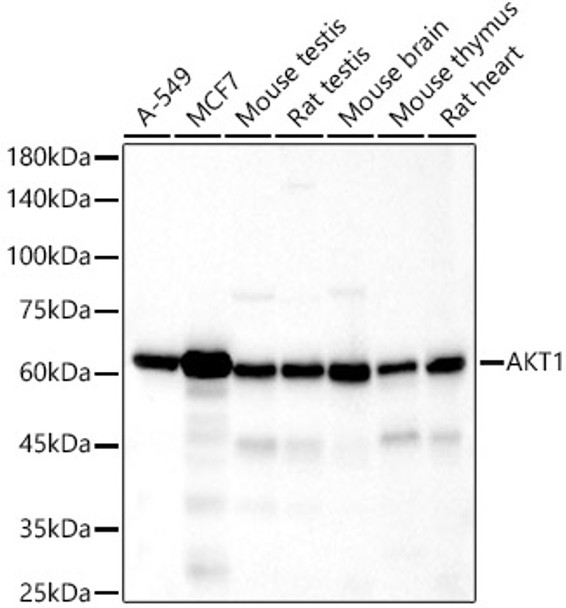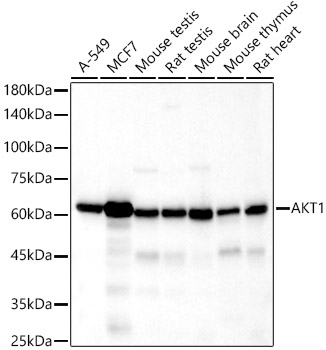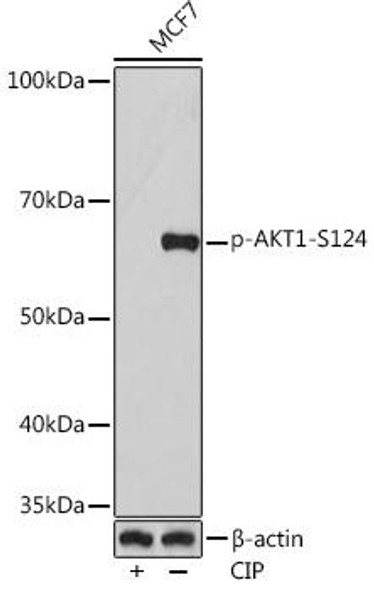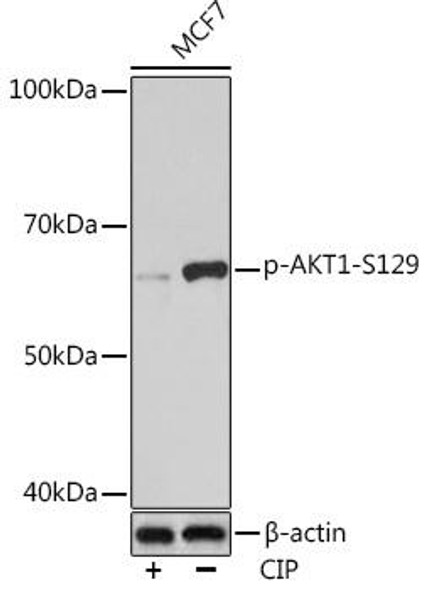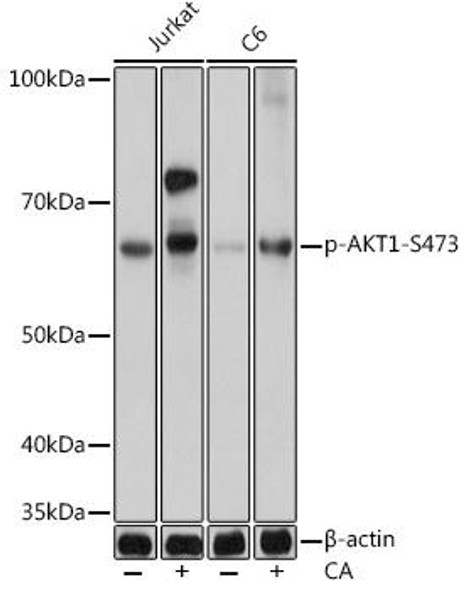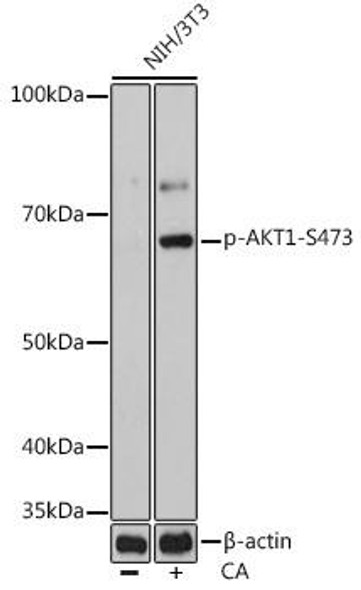Description
AKT1 Monoclonal Antibody (CAB17909)
The Akt1 Monoclonal Antibody (CAB17909) is a valuable tool for researchers studying Akt1 protein, a key player in various cellular processes such as cell growth, survival, and metabolism. This antibody, produced through mouse hybridoma technology, demonstrates high specificity and sensitivity in detecting Akt1 in human samples, particularly in Western blot applications. By targeting Akt1, researchers can gain insights into signaling pathways involved in cancer, diabetes, and other diseases, making this antibody essential for studies in cell biology and drug development.Akt1, also known as protein kinase B (PKB), is a serine/threonine kinase that regulates diverse cellular functions through its phosphorylation of downstream targets involved in cell proliferation and survival.
Dysregulation of Akt1 signaling is commonly associated with cancer and metabolic disorders, highlighting the importance of understanding its activity for the development of targeted therapies. The Akt1 Monoclonal Antibody provides researchers with a reliable tool for investigating Akt1 function and its potential as a therapeutic target in various disease contexts.
| Product Name: | AKT1 Monoclonal Antibody |
| SKU: | CAB17909 |
| Size: | 20uL, 100uL |
| Isotype: | IgG |
| Host Species: | Rabbit |
| Reactivity: | Human,Mouse,Rat |
| Immunogen: | A synthetic peptide corresponding to a sequence within amino acids 381-480 of human AKT1 (P31749). |
| Sequence: | SGLL KKDP KQRL GGGS EDAK EIMQ HRFF AGIV WQHV YEKK LSPP FKPQ VTSE TDTR YFDE EFTA QMIT ITPP DQDD SMEC VDSE RRPH FPQF SYSA SGTA |
| Tested Applications: | WB IHC-P IP ELISA |
| Recommended Dilution: | WB,1:1000 - 1:5000 IHC-P,1:50 - 1:200 IP,0.5μg-4μg antibody for 200μg-400μg extracts of whole cells |
| Synonyms: | AKT; PKB; RAC; PRKBA; PKB-ALPHA; RAC-ALPHA; AKT1 |
| Positive Sample: | A549,MCF7,Mouse brain,Mouse testis,Mouse thymus,Rat heart,Rat testis |
| Conjugate: | Unconjugated |
| Cellular Localization: | Cell membrane, Cytoplasm, Nucleus. |
| Calculated MW: | 56kDa |
| Observed MW: | 60kDa |
This gene encodes one of the three members of the human AKT serine-threonine protein kinase family which are often referred to as protein kinase B alpha, beta, and gamma. These highly similar AKT proteins all have an N-terminal pleckstrin homology domain, a serine/threonine-specific kinase domain and a C-terminal regulatory domain. These proteins are phosphorylated by phosphoinositide 3-kinase (PI3K). AKT/PI3K forms a key component of many signalling pathways that involve the binding of membrane-bound ligands such as receptor tyrosine kinases, G-protein coupled receptors, and integrin-linked kinase. These AKT proteins therefore regulate a wide variety of cellular functions including cell proliferation, survival, metabolism, and angiogenesis in both normal and malignant cells. AKT proteins are recruited to the cell membrane by phosphatidylinositol 3,4,5-trisphosphate (PIP3) after phosphorylation of phosphatidylinositol 4,5-bisphosphate (PIP2) by PI3K. Subsequent phosphorylation of both threonine residue 308 and serine residue 473 is required for full activation of the AKT1 protein encoded by this gene. Phosphorylation of additional residues also occurs, for example, in response to insulin growth factor-1 and epidermal growth factor. Protein phosphatases act as negative regulators of AKT proteins by dephosphorylating AKT or PIP3. The PI3K/AKT signalling pathway is crucial for tumor cell survival. Survival factors can suppress apoptosis in a transcription-independent manner by activating AKT1 which then phosphorylates and inactivates components of the apoptotic machinery. AKT proteins also participate in the mammalian target of rapamycin (mTOR) signalling pathway which controls the assembly of the eukaryotic translation initiation factor 4F (eIF4E) complex and this pathway, in addition to responding to extracellular signals from growth factors and cytokines, is disregulated in many cancers. Mutations in this gene are associated with multiple types of cancer and excessive tissue growth including Proteus syndrome and Cowden syndrome 6, and breast, colorectal, and ovarian cancers. Multiple alternatively spliced transcript variants have been found for this gene.
| Purification Method: | Affinity purification |
| Gene ID: | 207 |
| Clone Number: | ARC51582 |
| Storage Buffer: | Store at -20℃. Avoid freeze / thaw cycles.Buffer: PBS with 0.05% proclin300,0.05% BSA,50% glycerol,pH7.3. |

